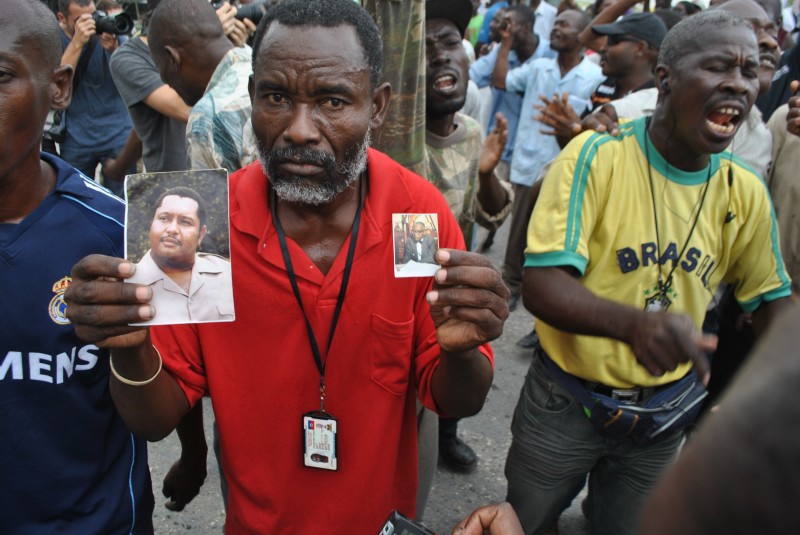
Protests as ‘Baby Doc’ returns to Haiti, 18 January 2011, Port-au-Prince, Haiti, photo by Jean Jacques Augustin. Demotix.
Former Haitian dictator Jean-Claude Duvalier died earlier this month, on October 4, at the age of 63. He was buried a week later, at a private service. Though many Haitians eagerly awaited a world without Duvalier, who was known as “Baby Doc”, his death has been an unusually ambiguous event.
Duvalier, or “Baby Doc”, succeeded his father, Francois “Papa Doc” Duvalier, as president of Haiti in 1971. At the time of his father's death, Jean-Claude was only 19-years-old — purportedly the youngest president in the world. Though considered less brutal than his father, “Baby Doc” carried on many of the same repressive policies. Most infamously, he continued using the Tonton Macoutes, a paramilitary group, to repress by force any political opposition. It's estimated that the Tonton Macoutes are responsible for the deaths of more than 60,000 Haitians.
Jean-Claude Duvalier was deposed in a coup in 1986 and fled to France, with his then-wife, Michelle, and at least $300 million USD, stolen from the Haitian treasury. This was a large amount of money at the time, of course, but it's difficult to measure the enormity in Haiti's context. According to recent statistics, the beleaguered island nation is the single poorest country in the Western Hemisphere and the 20th poorest country in all the world.
After Haiti's devastating earthquake of 2010, “Baby Doc” controversially returned from exile. Despite charges made against him for corruption and human rights abuses, formal legal proceedings never got far and he died a free man. Duvalier was, however, denied a state funeral — a small victory for those who'd hoped to see him held accountable for his crimes.
Writing in French on Facebook, Pierre Joel provided an incomplete list of the victims of the Duvalier regimes (both the “Papa” and “Baby” Docs) over the period of 1957–1986. Amnesty International also published a video featuring the victims of the Duvalier regime:
Once news of Jean-Claude Duvalier's death broke, several members of the Haitian diaspora, many of whom left Haiti because of persecution, sought to share their feelings. Haitian-American Patrick Gaspard, the United States Ambassador to South Africa, tweeted his thoughts:
On Duvalier's death I'm thinking of the look in my mother's eyes when she talks about her brother Joel who was disappeared by that dictator.
— Ambassador Gaspard (@patrickgaspard) October 4, 2014
Some people on Twitter have pointed out that the United States helped support the Duvaliers, despite their violent tactics with opponents at home:
The US strongly backed Duvalier because he kept the huge majority of Haitians under control. And he was anti-communist.
— Alyssa (@alyssa011968) February 9, 2014
Others criticised current Haitian president, Michel Martelly, for his association with Duvalier and his supporters:
But #Martelly‘s silence about #Duvalier‘s atrocities, even offering condolences on behalf of the #Haitian people, is unconscionable.
— Fabienne Doucet (@bailabomba) October 4, 2014
We must – as Haitians, as people who stand for justice – NOT allow the illegitimate Martelly government to hide Duvalier's terrible legacy.
— J. Pierre (@BLK_DIASPORAS) October 4, 2014
Though Duvalier is now in the ground, some Twitter users are still distressed that so many of the figures from the dark days of his dictatorship are still around:
#Haiti: The Highest concentration of Right-wing criminal were at J.C.Duvalier funeral at Saint-Louis de Gonzague https://t.co/0u4ix90Xs2
— Matelamotgagot (@Matelamotgagot) October 13, 2014
The Duvalier funeral reminds us that a lot of criminals are still roaming around Haiti with impunity..
— Haiti Justice (@haiti_justice) October 12, 2014
The Duvaliers never paid for their crimes while they were alive; indeed, the fact that justice was not served is still a thorn in the side of many Haitians. Some hope for other forms of justice, though, seeking reassurance in an old Haitian proverb:
Haitian brethren, as the dictator Duvalier is laid to rest, remember the Haitian proverb: “A beautiful funeral does not guarantee heaven”
— French Havana (@FrenchieGlobal) October 11, 2014






